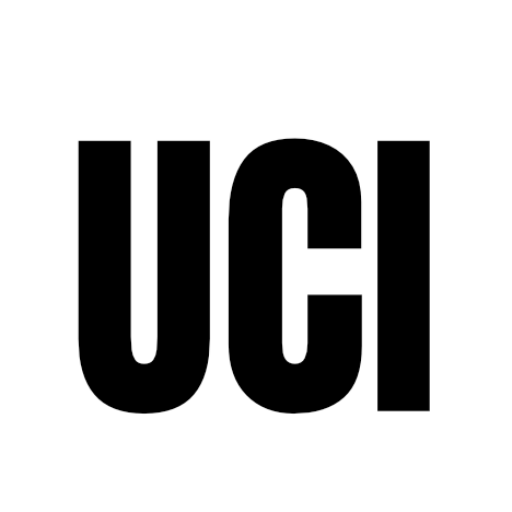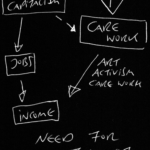About the radical work of Timothy Speed
-
Timothy Speed
- July 9, 2024
The True Story – An External Perspective on Artistic Positions from Three Decades of Interventions in Economy, Art, Society, and Government Agencies.
“I consider the empirical and economic theoretical investigation of self-determined work, as undertaken by Mr. Timothy Speed, to be very meaningful. Conflicts with the conventional understanding of work as wage labor must not be ignored.” (Former Vice President, Club of Rome Prof. Ernst-Ulrich von Weizsäcker)
“I thank you for your intelligent and interesting texts.” (Jean Ziegler, UN Diplomat, Author)
Born in England in 1973, raised in Austria, and living in Germany for three decades, artist, human rights defender, and researcher (artistic research) Timothy Speed has created a comprehensive body of work over years of foundational research and artistic endeavor. His work explores what happens when an individual tries to integrate the complexity, paradoxes, and deep ecological, economic, and social issues of society into their own gainful employment, pressing it into jobs to simply do “relevant work” in the sense of the whole. This is done from the perspective of those affected, or the people on the ground. Even when it is unpaid, not the official job assignment, necessary but unwanted, Speed aims to authentically and contemporarily assume responsibility in conscious conflict with a simplifying and often obedience-manipulating, narrow capitalist market.
As a result of this engagement, Speed went bankrupt due to the friction involved. However, crucially, he continued for over 10 years, confronting society, the state, and corporations with the paradox and critique that his work—the attempt to address the real problems by integrating the subjective and objective—would be desirable and necessary as a role model of a postmodern, socially and ecologically responsible human in the Anthropocene. Yet, he was not paid, honored, or allowed to act in this role. This existential ban, which forces people to act through a filter of capitalist-defined usefulness, was something Speed wanted to break through, as it also revealed the root of the one-sided view and treatment of society and reality.
The unique aspect of Speed’s approach is that he disproves most Western concepts for saving the world by showing both the power and powerlessness of the individual. He exposes the illusion that we can continue with capitalism in such a way that simply doing one’s job will simultaneously prevent ecological and social catastrophe. By drawing everything into the personal realm, he makes visible the complexity and concreteness, demonstrating that we need approaches that are significantly more individual, liberal, free, subjective, and at the same time social. Ultimately, it remains a question of individuals in community resolving fundamental conflicts—something only humans can do if they so choose.
Gainful employment as the dominant action must be fundamentally reconsidered. In his poetic science (artistic research), Speed shows how humans can be reintegrated into the creation of knowledge, which is urgently needed in light of AI and robotics. The question of how the world should be shaped can no longer be solely an objective one; the perspective of those affected must also be included in democratic processes.
Speed has provoked with this approach for decades, starting in 2001, challenging companies like Red Bull, Deutsche Bahn, or entrepreneurs like Josef Ackermann (Deutsche Bank CEO), Liz Mohn (Bertelsmann Foundation/RTL), and Johanna Quandt (BMW) through his actions and empirical investigations throughout the 2010s. Not to mention countless government agencies, ministries, authorities, job centers, as well as prosecutors and courts, which he addressed with actions in the 2020s. For instance, he applied for positions such as the director of ZDF and the host of “Wetten, dass..?” to reverse the hierarchy of job distribution as an unemployed person and demanded self-empowerment of the poor. As early as the late 1990s, at the dawn of the New Economy, he fought with media corporations to establish an Internet of depth, foreseeing the danger of superficiality posed by Facebook, X (formerly Twitter), and others.
In his first book in 2001, “Verdammt sexy – Die Mediengestalter in der Krise” (“Damn Sexy – Media Designers in Crisis”), he demanded societal responsibility from media designers in lectures on large stages, advocated for more amateurism in media, and alienated about 1,000 advertisers at the world’s largest advertising congress (TYPO) with his theses on the damages caused by lying advertising.
While solutionists (according to Morozov), like those of Silicon Valley, pursued solving all world problems through smart, simplified jobs and new technology on one side, Speed always positioned himself on the opposite side, seeking to make jobs and the entire economy more complex and critical so that the acting human being approaches the real reality through work. In an encounter between Speed and Michael Grinder, the brother of NLP co-founder John Grinder and a star of 90s management methods, Grinder condescendingly told Speed in 2008 that he was not solution-oriented, as evidenced by his furrowed brow.
Speed’s decision for more complexity and relational capacity was always either criticized as the wrong attitude, not service-oriented, or considered work refusal when he consequently became impoverished. He often faced hatred and contempt when he spoke of doing this in the interest of humanity.
The research Speed has been conducting for decades, with tremendous effort, serves as an example of how ecologically and socially responsible action must lead to new forms of work that grant the individual more inner freedom rather than continuously reducing it. He exemplifies a radical relational capacity in work. He also highlights the problems arising from this, such as massive rejection based on traditional notions of work and duty, as seen in Protestant work ethics, where self-reduction and conformity are paramount (Max Weber).
Speed engaged almost unpaid for 30 years, not bankrupting due to his resistance but due to his commitment, was persecuted by the state, sued (SLAPP lawsuits 2023), and finally made ill by right-wing extremists in the authorities through psychological terror. His naturalization was rejected because of his art and research on work, and attempts were made to destroy him by depriving him of his livelihood.
In striving to act as a “whole person” and not split off for the job to function, Speed inevitably became a paradoxical art figure, as he appeared everywhere as himself. This is also evident in his feature film “Transfer Protocol,” in which he plays himself.
Speed thus dissolves the boundaries between work and existence, between market and individual, making everything a unity of the acting individual who seeks to meet many responsibilities simultaneously, ultimately failing but thereby making it all the more visible.
As a 10-year-old who touched the hand of Margaret Thatcher, the British Prime Minister, the so-called “Iron Lady” and mother of neoliberalism, in an encounter, he was deeply shocked by the mixture of coldness, fake, and power. This encounter disturbed him so much that he increasingly perceived societal conditions as wrong and contradictory. Another significant experience in his childhood occurred in a British school when he was to betray other students and was presented with either the cane or a bowl of sweets by the headmistress. This ethically unsolvable conflict for a child led to a deep mistrust of rewards, i.e., wages, as a means of directing human will. This also made him later radically question the societal frameworks of work, contribution, and value. He saw gainful employment as a deep corruption from which he had to break free his entire life. Therefore, he primarily pursued intrinsic motivation, exploring what genuinely authentic contributions mean for the individual and society. He perceived general societal value concepts as fake, as lies. Against this background, he developed methods, models, and approaches for a changed way of working where “diligence and performance” were not paramount—categories always subject to external interpretation—but genuine engagement and innovation capability, rather than simple functioning. He wondered how democratic participation could also happen through work, similar to Axel Honneth’s considerations in “The Working Sovereign.” He attempted to clarify the value of a contribution and the role of free will in it to do justice to the complexity of reality in action, understanding lively negotiated relationships with society as deepened responsibility in action (like a dialogue in the sense of Habermas). Democracy and individualism as the basis of work itself. He defined forced labor as work in isolation and showed the significance of self-determination to make economies structurally more complex, thereby serving as the foundation for more humane societies. Speed dealt extensively with the question of structures that dynamically integrate ecology and economy, society, and the individual.
His works, due to their emergence, show more than the sum of their parts, revealing what only art achieves: a creative vision of an alternative occurring in his works but not always explainable. He extracts this other structure in countless projects and dialogues with corporations and authorities from existing conditions until something new gradually becomes visible. This new often remains subjective (intersubjective) yet transferable to many. For him, art is research, and his books are literary essays attempting to reintegrate the individual into an objectified world.
More under https://timothy-speed.com



